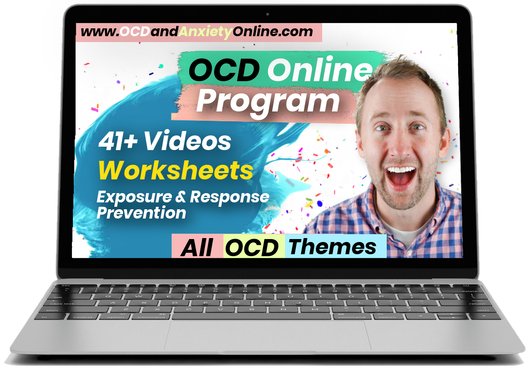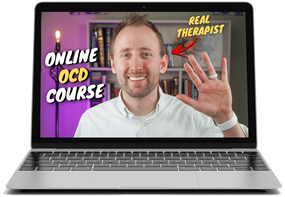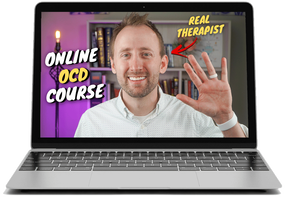Exposure Therapy For OCDWhen somebody is facing their fear, they repeat this process over and over again their body tends used to it. We’ve seen this in many different ways such as jumping into a really cool swimming pool. At the very beginning it is very cold but their body adapts and get used to it. We didn’t have to spend time convincing ourselves it was going to get better, it just happens. This can be seen when we are using exposure and response prevention. When you are exposing yourself to the upsetting fear it’s going to feel very difficult at the beginning. Overtime, you may face the same fear but notice that the anxiety level is a lot less. This is seen as the habituation model. That we essxentially are doing exposures to reduce your anxiety by half or more. You’re getting used to it, you’ve taken the value away from it. When it comes to the habituation model, it’s all about this anxiety reduction in your body adapting just like the swimming pool. We will often use us as a measure of success if you were doing exposures correctly. If you’re anxiety is reducing this is a good thing. There are definitely some drawbacks from using the habituation model. Anxiety is something that we want to take value away from as well. If we are focusing solely on anxiety and having us go up and down individuals can get stuck in paying attention to the anxiety and wondering if they are doing the exposure correctly or not. Let me start obsessing about the actual anxiety versus the actual fear. Many will start to question and wonder why they’re in anxiety is not reducing. Well evidence shows that the habituation model does work, individuals can you get stuck with these pitfalls often. This is why there is another approach to exposure and response prevention called inhibitory learning. While this is still being researched there is evidence that shows that this helps reduce OCD symptoms as well. The difference is not the actual exposure you were doing but rather the way you were approaching it. With the inhibitory learning model you are teaching your brain more than reducing anxiety. Exposures are all about what can your brain learned from this experience. It doesn’t matter if your anxiety reduces or not. It might not even matter if you have anxiety while you’re doing the exposure. The whole mindset is all about your brain learning something new. So if I was facing a fear that really caused some anxiety, the way I approach is designed is to face the fear, expose yourself to it and RESPOND differently to the fear. You sole focus is what am I teaching my brain by every movement, words I’m saying, what I’m thinking, how I’m behaving. If I avoid touching something because it’s contaminated, my brain learned that that thing is dangerous. If I touched it and acted like it wasn’t a big deal and didn’t do any compulsions, then my brain learns it’s not a big deal. You may learn time and time again that you faced your fear and NOTHING happened. That is what the brain is learning. If you’re confused by the two, here is an easy way to remember: The habitual model means your body is getting used to it and your anxiety is reducing. Inhibitory learning model means your mindset is all about what your brain is learning from the exposure regardless of the anxiety felt. Realistically, there isn’t the right choice comes to do an exposures. You do what you feel like is best for you. I have used both models together where I focus majority of my time making sure that the person knows that the brain is learning something. We use anxiety as a measure but ultimately it doesn’t matter if the anxiety reduces or not. If your brain can learn that the fear that you have is not happening and it is it because you’re trying to control the situation what is the compulsions and to me that’s one of the best ways to do an exposure. Let things be. Stop controlling. It feels like an experiment, but the experiment is worth taking for your brain to learn something major. That you’ve never been a danger. Inhibitory Learning For OCDHabituation For OCD
0 Comments
My OCD Feels UniqueYou are not special! WAIT! Don’t don’t run away! I needed to get your attention for a moment. If you leave now you think I’m just a big jerk. Here’s what I mean by this!
So here is what I mean by you not been special. First of all your special. You matter in your feelings matter. Because you’re even watching this video right now it shows a lot of strength. So what I’m really meaning is that the OCD that you are experiencing is not different. Individuals can often think that the topic or theme that they are going through this special, it’s different, no one understands exactly what they are going through, its untreatable, I hear all these videos online I see all this advice but it doesn’t apply to my theme. Errrrrr! Nope! Your OCD is not special or different. This to me is one of OCD’s biggest lies. If it can make you believe that you are untreatable and that you are different from what you are experiencing then it’s got you. Individuals will often tell me that exposures they hear the specific theme just don’t apply to them. That if people really knew all the details of everything there experiencing they would change the treatment. So this is something that is important to note, something to tell your OCD even if you think it is different than everyone else’s to remind yourself that OCD is OCD. That follows the same route as everybody else. It’s making you doubt in question yourself and who you are as a person. It’s making you question the threats in the future and if they can come true or not. It’s giving you an intrusive thought putting a lot of meeting on this thought making you feel anxious that’s wanting you to do something to fix it. Simple as that. When we see OCD simply becomes simple. If you see OCD is complicated, different, or special, than it has the upper hand. To take control is to see it simply. Do not see yourself as different or special. Like I said you as a person are unique and special. Your OCD does not get to join this party. So as you’re seeing the videos that I have, your hearing advice given, and you think it doesn’t apply to your theme. Remember that this is a lie. Give yourself more credit. You can even remind your OCD that it’s not special when it’s trying to take the light. Give yourself the opportunity to do treatment. I know what people say, “but if you only heard what I’m going through you’d be shocked. You would say that mine is different.” Don’t even allow your brain to go there. Instead he focus on living life and enjoying. This tactic the OCDs using is no longer going to be something you fall for. Treatment is available if you’re looking for a specialist. So here’s my question for you, have you ever felt that your OCD is different than everyone else’s? How To Stop Ruminatingmination is essentially trying to problem solve the perceived threat or fear. It’s not as easy to just say, “stop ruminating”, so here are some tips for you when you feel like you’re stuck in the OCD rumination.
Mental Hoarding OCDMemory Hoarding can be so difficult for the person experiencing it. Imagine feeling the need to remember EVERYTHING. Seriously. If you can’t keep the memory, you’re not sure what will happen. Something bad? Maybe you’ll regret not having it when you need it. You're feeling anxious because there is a fear that you may need the memory later. Let us go through what mental hoarding looks like and how to do evidence-based treatments for it. Afraid to lose a memoryMemory HoardingLife AFTER OCD | What does it look likeWe often talk about what to do when you're having OCD symptoms. But, what does it look AFTER you go through treatment? Do you stop treatment? Are you cured? Let's go through this so you can have a good perspective of what "recovery" looks like. Schizophrenia OCDSchizophrenia OCD, Psychosis OCD, or plain ol’ “Am I going crazy” OCD. Whatever you call it, it can be very distressing to those to experience it. OCD can make someone believe anything. Even make you believe that you may be going crazy. You may even wonder if you’re hearing voices or seeing things that aren’t there. Let’s go through what it looks like and how to do the treatment. Check Out The Online Course For OCDPsychosis OCDGoing Crazy OCDWhat is Hit and Run OCDHit and run OCD. This can be very difficult to navigate through. Every bump on the road signals to you that you may have actually hit someone. You may search for evidence to gain some clarity of if you actually did or not. This ends up keeping the person trapped and doubting. Let’s go over the treatment for hit and run OCD and what it looks like. What If I Like My OCD Thoughts?It is pretty common for individuals to worry that they might like the OCD feared thoughts and even the sensations. This can be a new obsession for them as they try to navigate through it. One of the biggest fears is that if they like the thoughts, it must mean something. It makes them think that their fear will come true. 🖐🖐Check out my ONLINE self-directed program for OCD🖐🖐 👉👉 https://www.OCDandAnxietyOnline.com 👈👈 What if I like my OCD feelings?My OCD is tricking meHow To Be Successful With OCD TreatmentIf you're working through exposure and response prevention; these 25 tips are GOLDEN. Originally presented by Fred Penzel, Ph.D. of Western Suffolk Psychological Services. Dr. Penzel gave me special permission to present his 25 tips to you. 🖐🖐Check out my ONLINE self-directed program for OCD🖐🖐 👉👉 https://www.OCDandAnxietyOnline.com 👈👈 25 Tips for Succeeding in Your OCD TreatmentHow to maintain progress OCDHow to remove guilt from OCDIt’s pretty natural for individuals with OCD to feel guilt. This guilt can make them believe that the intrusive thoughts and feelings must mean something great. This feeling of guilt can be such a roadblock for many individuals going through treatment. Let’s go through what to do when guilt hits you during your OCD. Guilty feelings with OCDRemove guilt from OCD |
AuthorNathan Peterson specializes in working with OCD and Anxiety related disorders and has done so for the past 7+ years. Archives
January 2023
Categories
All
|




 RSS Feed
RSS Feed